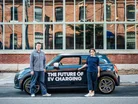Itselectric Transforms Urban EV Charging in New York

Transitioning to EVs remains a daunting challenge globally, and a key obstacle is the availability of charging infrastructure, especially in urban areas.
A Brooklyn-based startup, Itselectric, tackles this issue head-on by installing public curbside chargers in front of residential and commercial properties, compensating property owners for the electricity they provide.
A critical push toward EV adoption
As the US aims for half of all cars sold to be electric by 2030, the demand for EV infrastructure is skyrocketing.
New York City anticipates a surge in EV registrations, jumping from the current 62,000 to an estimated 3 million within the same timeframe.
Yet, for city dwellers relying on street parking instead of home driveways or garages, finding a charging station remains a persistent hurdle.
Itselectric, adopting the tagline “Power from the People,” is addressing the gap.
It plans to help expand NYC’s EV charging network from 1,400 stations to 10,000 by 2030.
Compact chargers with potential
By design, the chargers, developed by Itselectric, blend seamlessly into urban environments.
Nathan King, Co-founder of Itselectric, stated: “We’ve removed the big, the bad and the ugly from charging stations.”
The chargers, smaller than a fire hydrant, offer an affordable solution for EV users, with charging sessions costing around US$10. Users can pay via a dedicated app or a credit card.
Most of the revenue is passed through to property owners hosting the chargers.
Tiya Gordon, Co-founder of Itselectric, explained: “We’re just putting a little charger in front of someone’s building on their curbside. And they’re earning potentially thousands of dollars per year—offsetting their annual electric bill and putting money in their pocket.”
According to the company’s estimates, a typical New York homeowner hosting a charger could earn about US$3,500 annually, thanks to a separate meter that ensures the home’s electric bill remains unaffected.
Focusing on level 2 chargers
Itselectric specialises in Level 2 chargers, ideal for urban neighbourhoods where EV owners can charge their vehicles overnight.
Although these chargers take 4 to 10 hours for a full charge, they consume less energy than Level 3 chargers, which require significant power but can fully charge a vehicle in under an hour.
The startup’s approach aligns with national trends. The Department of Transportation recommends building seven times more Level 2 than Level 3 chargers.
Backed by major investors
The vision of Itselectric has drawn significant investment, with the company raising US$11.8m from venture capital firms like Brooklyn Bridge Ventures and Uber.
These investors see the startup's potential to play a critical role in scaling the EV ecosystem, particularly in ride-share services.
However, the co-founders’ status as a married couple initially raised investor concerns. “For some investors, it’s a red flag,” Nathan acknowledged.
Building an urban EV ecosystem
The concept for Itselectric emerged during the pandemic when Nathan and Tiya struggled to find charging options for their newly purchased EVs.
An architect, Nathan saw the problem as an urban design and construction challenge.
The startup’s innovative hardware and business model simplify the permitting process and ensure compatibility with private properties.
A bold vision for the future
Although building and installing chargers involves significant upfront costs, the co-founders see it as a long-term investment. “We are undergoing a once-in-a-lifetime transition within transportation,” Nathan emphasised.
The company has deployed chargers near its Brooklyn Navy Yard headquarters and in select locations across Brooklyn and Detroit. Plans are underway to expand to cities like Boston, Jersey City and Los Angeles in 2025.
Tiya, once sceptical of EVs, is now a staunch advocate. “I will never consider getting a gas car again,” she said. "As people start to encounter EVs, they’re going to get them… I am very optimistic.”
By creating a network of accessible and efficient chargers, Itselectric is helping to create a more sustainable transportation future.
Stay informed and inspired with the EV Magazine community by signing up for our free weekly newsletter. Each week, receive in your inbox the latest industry news and in-depth insights into the world of electric vehicles, sustainability and cutting-edge innovations.
Don’t miss the opportunity to stay ahead in the fast-evolving EV industry. Subscribe here (link: https://email.evmagazine.com/k/Bizclik-Media/ev_newsletter_signup_form)
EV Magazine is a BizClik brand


